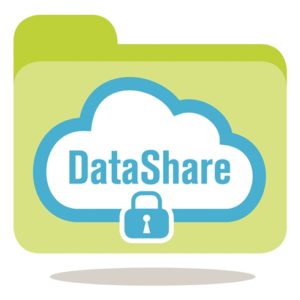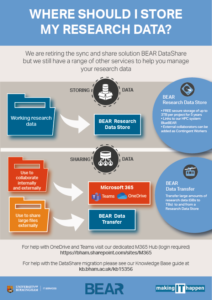
Update – 21st January 2022 11am
The BEAR DataShare service has now been retired and you will no longer be able to login via the web portal https://beardatashare.bham.ac.uk. Any data synced to your computer via the BEAR DataShare Client will remain on your computer but changes made will no longer be synced with anyone that you shared the files with and the data will no longer be backed up to BEAR storage.
Data Recovery
After the decommissioning on January 21st 2022, data will be kept in our archive for three years, to allow for researchers to request recovery of data if they were unable to move data off before the service was shut down e.g. being on parental leave. Please note that the speed at which data can be provided will be dependent on the workload of the team. If you need to recover data that was stored on BEAR DataShare then please log a ticket via the Service Desk: https://intranet.birmingham.ac.uk/bear/sd/other-bear-request
See our Data Retention and Deletion webpage here.
——
We will be retiring the BEAR DataShare service on January 21st 2022, this is due to the University investing in OneDrive for Business, part of a suite of products now available via Microsoft’s M365. Please note that we will still be providing the BEAR Research Data Store (RDS), which is the service for your working research data. Data in the RDS is stored in data centres on campus and 3TB of storage space is provided per project.
How does this affect me?
If you are a user of BEAR DataShare for sharing and syncing data, you will need to move your data from the service by 21 January 2022.
What do I need to do?
- Decide where you are going to migrate the data to.
- Review who has access to the data and who still needs access.
- Inform collaborators using BEAR DataShare.
- Move the data before 21 January 2022. We would strongly advise you not to leave it until the last minute.
What is not changing?
All other BEAR Services including BEAR Research Data Store, BEAR Data Transfer and BlueBEAR are remaining.
Background and more info
BEAR DataShare was implemented around 2015 in response to many researchers’ requests to share files that were too big to send via email, specifically when Supervisors needed to review their PhD students’ thesis. We therefore provided DataShare to facilitate sharing data, with its large 20GB quota and version control, plus the added advantage of having the data stored on campus.
Over time the number of users ballooned to 4,500, with it proving particularly popular for sharing data with external collaborators. In response to researchers’ requests, we increased the storage quota to 25GB and then to 50GB. This helped revolutionise how our users collaborated on research projects and sped up the way they interacted with others. We have since provided BEAR Data Transfer in response to researchers’ needs to share large files (GBs to TBs) with external collaborators – please note this service will be remaining.
As there are different ways to share data via M365, we have outlined some use cases – see Where should I store my research data. For M365 user guides including videos, visit the M365 hub.
So, what are the advantages of moving to M365 for sharing data?
- M365 integrates into Windows seamlessly with online editing utilising Office 365.
- M365 (OneDrive) has a storage quota of 100GB compared to 50GB for DataShare.
- Ability to have more granular permissions when sharing data.
- Utilises the University 2-factor authentication for login, for increased security.
- Ability to share files of up to 100GB in size.
- More reliable syncing and integration for Macs.
To provide a smooth transition, IT Services will be creating guidance on how to transfer the data from BEAR DataShare to M365 – see Migrating data from BEAR DataShare.
Things to be aware of:
- Permissions are not transferred, so it will be a good time to review who can access what data.
- Older versions of the data will not be copied over, so if you need an older version, it’s best to recover them and name them differently.
- If you’ve specified using BEAR DataShare in your Ethics document or Data Management plan, then you will need to revisit it and change it to M365 or ‘University provided secure storage’.
- Microsoft 365 storage is not currently backed up, however it is resilient storage in that it is stored in multiple places in case of disaster recovery, deleted files can be recovered for up to 90 days and previous file versions can be kept and reverted to.
See the guidance for use document for more details on what types of data can be stored on M365.
So what’s the plan?
- March 2021: We are letting all our UoB users know via the bear-datashare mailing list and other BEAR users through the bear-updates newsletter.
- Monthly emails: Updates to users containing any new guidance on transferring data and reminders that the service will be retired.
- July 2021: Stop any new researchers being automatically added to BEAR DataShare when they start at the University.
- 21 January 2022: Stop the service, archive the data and decommission the service. At this point you will no longer be able to sync and share data.
We understand that this change is significant for those who utilise BEAR DataShare, but we can reassure you that IT Services are on hand to help you migrate and we will still be responding to your issues using DataShare until we stop the service on 21 January 2022.
Thank you for your continued help and support.
Further information:
Where should I store my research data?
Migrating data from BEAR DataShare

